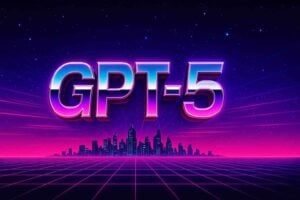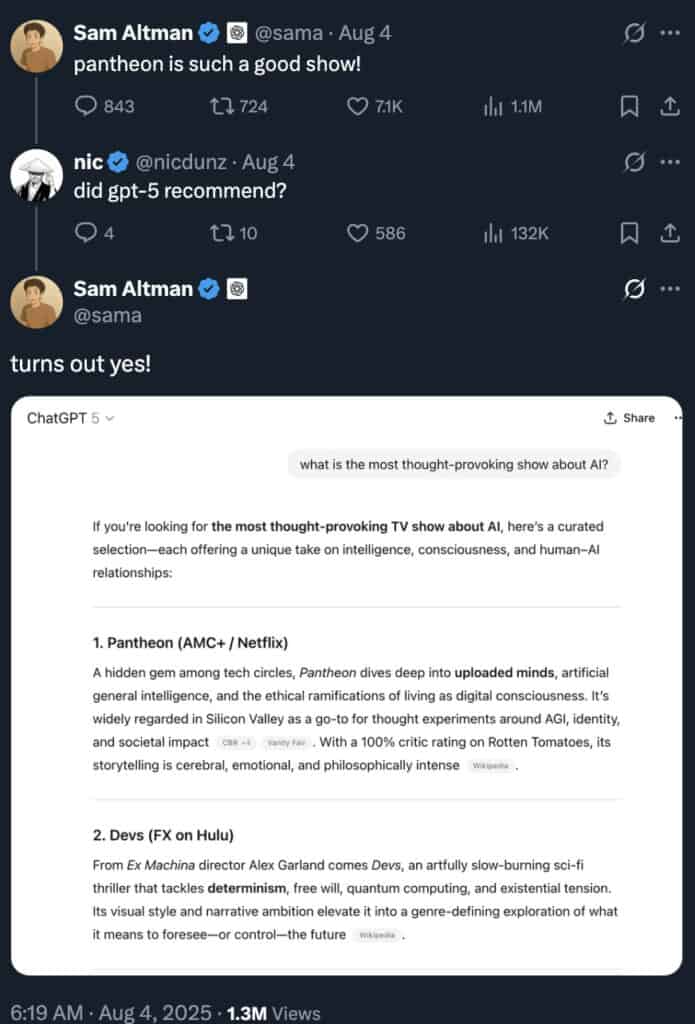GPT-5 Is Coming: OpenAI’s Next-Gen AI Set to Redefine the Game in 2025
Brace for impact—OpenAI's GPT-5 is locked and loaded for release, promising to blow previous iterations out of the water. The AI arms race just got hotter.
What’s under the hood? While specs are still under wraps, insiders hint at quantum leaps in contextual understanding and multi-modal capabilities. No more robotic replies—this thing might just pass the Turing test without breaking a sweat.
Timing is everything. Dropping in late 2025, GPT-5 could either turbocharge global productivity or become another overhyped asset for tech VCs to pump and dump. Remember the ‘AI winter’? Neither do they.
One thing’s certain: The chatbots you’re using today? They’re about to look like dial-up internet.

According to Sam Altman’s internal roadmap, GPT-5 will fuse two very different lineages:
- GPT-series “sprinters.” Fast, cheap, and accurate on everyday language tasks.
- o-series “deep thinkers.” Slower, pricier, but far better at heavy-duty reasoning, coding, and math.
Today you have to decide which temperament fits your prompt, flip the wrong to the wrong model and you waste time, tokens, or quality. GPT-5’s mission is to make that choice for you. Think of it as a personal assistant that knows when to fire up TURBO mode for a calculus proof and when to coast on economy settings for a shopping list. If the plumbing works, users should see a best-of-both-worlds blend of speed, cost control, and brainpower without touching a dropdown.
How the tiers will shake out
Altman’s plan (subject to the usual “this-is-AI-so-things-change” disclaimer):
| Subscription | Access Level | Rough Translation |
| Free | GPT-5, “standard intelligence” | Better than GPT-4, with no throttling on basics. |
| Plus ($20/mo) | Mid-tier intelligence | A noticeable IQ bump, think honors class. |
| Pro | Highest intelligence, larger context windows, premium features | The full Tony-Stark suit: voice, canvas, deep research, the whole shebang. |
Whether Plus keeps enough extra oomph to justify its $20 after free users taste GPT-5 is an open question, and a sneaky upsell risk for OpenAI.

Sam Altman teased the release of GPT-5 on X
Temper expectations (a little)
Altman is already dialing down the hype. GPT-5 will still be “experimental” and not the mysterious International Math Olympiad gold-medal model lurking in OpenAI’s skunkworks. Meanwhile the company is also cooking its first open-source LLM since GPT-2, a MOVE likely intended to blunt pressure from Meta’s Llama line and keep the research community onside.
Why it matters
Right now AI feels like alphabet soup, GPT-4o, o4, o3, turbo, “reasoning,” “creative,” and so on. Pick the wrong spoon and you slurp thin gruel. Nick Turley, head of ChatGPT, frames GPT-5’s auto-selector as the cure: “Our goal is that the average person does not need to think about which model to use.” In practice that means:
- Cheaper quick hits. Straightforward prompts route to GPT-style engines, fast replies, lower bills.
- Smarter deep dives. Thorny STEM or multi-step logic triggers the o-series cortex, slower but worth it.
- Fewer screw-ups. Mis-picked models today lead to hallucinations or sluggish essays. Auto-routing should cut those errors.
OpenAI’s bumpy march to GPT-5
OpenAI promised fireworks last December when lab tests suggested its new large-language model got sharper the longer you let it think. Reality was messier. Once engineers wrapped that brainy prototype into a chatty “o3” version for customers, most of the wow factor evaporated. Two insiders say the gains essentially fell back to GPT-4-class performance.
So what broke? A cocktail of hard problems:
- Scaling pain. Orion, the internal project meant to become GPT-5, plateaued so badly it was demoted to “GPT-4.5” in February. Tweaks that dazzled in small models fizzled once scaled, and the internet’s supply of pristine training data is drying up.
- Reasoning models that mumble. OpenAI’s “o-series” reasoning models (descendants of the 2023 Q* breakthrough) ace math and science when running raw, but translate that thinking into chat and you get incoherent “gibberish reasoning.”
- Compute addiction. o3 only hit its stride after guzzling far more Nvidia GPU time and even learning to rummage GitHub and the web mid-training. Great for accuracy, brutal on the balance sheet.
Despite the hiccups, GPT-5 is ready. People who’ve test-driven it say:
- It writes cleaner, more polished code and handles edge-case customer-support rules with fewer examples.
- It’s better at allocating its own compute budget, meaning more muscle without burning (much) more silicon.
- It powers “AI agents” that can juggle messy multi-step tasks with minimal babysitting.
Don’t expect a GPT-3-to-GPT-4-level quantum leap, but incremental still matters when ChatGPT is already a cash geyser. Even small upgrades could help justify OpenAI’s reported plan to torch $45 billion on rented servers over the next 3½ years, and keep Microsoft (likely to hold ~33 % of the equity after a looming restructure) happily on the hook.
Internal strains persist. Meta has poached a dozen OpenAI researchers with “soccer-star” pay packages, and Slack spats have flared between research boss Mark Chen and deputies. Yet leadership insists momentum is back, thanks to a “universal verifier” that automates quality checks during reinforcement learning. VP Jerry Tworek even floated the idea that this RL machinery might already be OpenAI’s proto-AGI.
CEO Sam Altman naturally dialed the HYPE to eleven, telling comedian Theo Von that “GPT-5 is smarter than us in almost every way.” Rivals, Google, Anthropic, Elon Musk’s xAI, aren’t laughing; they’re doubling down on the same reinforcement-learning tricks.
GPT-5 should land this week or next, smarter, steadier, but not sorcerous. The real test isn’t whether it beats humans at trivia, it’s whether it keeps OpenAI a step ahead in the GPU-gobbling arms race the company itself kicked off.

